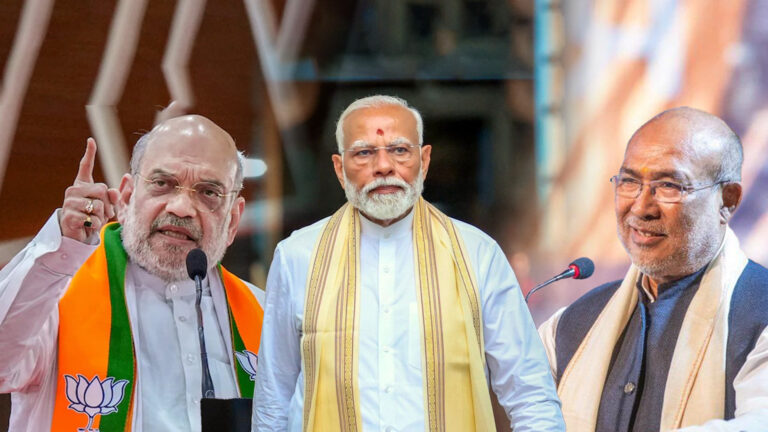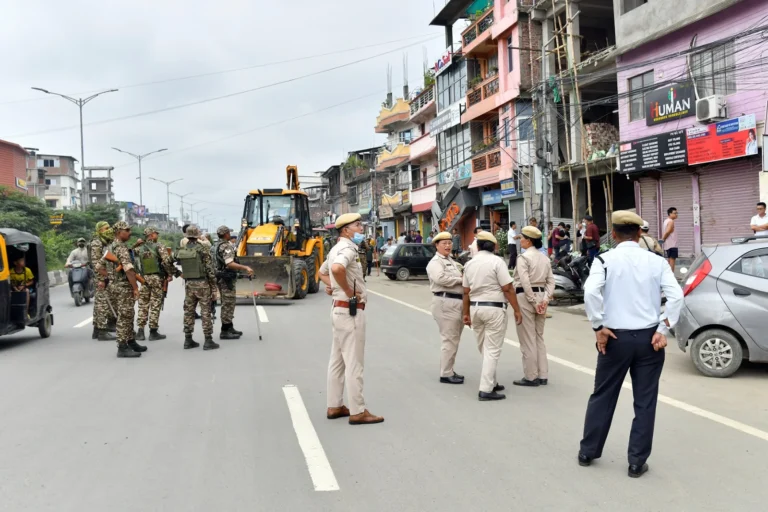Manipur Police Detain One in Yaingangpokpi, Hand Over to Assam Rifles for Family Reunification
Summary of the News Article
In an incident that highlights ongoing tensions in the region, Manipur police recently detained an individual at Yaingangpokpi and handed them over to the Assam Rifles for family reunification purposes. This action was part of a broader effort to restore stability in the region, which has been marred by conflict and unrest. The move by the police demonstrates ongoing cooperation between local law enforcement and the military in managing the situation.
Understanding the Incident: A Broader Perspective on Manipur’s Crisis
The situation in Manipur, particularly around the Yaingangpokpi region, has been tense for months. The area has seen sporadic clashes between different ethnic groups, insurgent activity, and crackdowns by security forces. The recent detention and handover of an individual to the Assam Rifles indicate both the complexity of managing law and order and the critical role that family reunification plays in peace-building efforts.
You might be wondering: Why is family reunification a part of this operation? In conflict zones, especially where ethnic or political violence is rampant, families often get separated. Reuniting individuals with their families can help de-escalate tensions and humanize the security process, which often feels distant and impersonal. This article will take you through the background of the current crisis in Manipur, the role of law enforcement, and why incidents like these matter in the larger peace process.
Manipur’s Ongoing Conflict: A Brief Recap
Manipur, a northeastern state in India, has been struggling with ethnic violence and insurgency for decades. The state is home to several ethnic groups, including the Meitei, Kuki, and Naga communities. Over the years, disagreements over land, political representation, and resources have often escalated into violence.
In recent months, the situation has worsened, particularly in areas like Yaingangpokpi. Ethnic clashes, bandhs (strikes), and the presence of insurgent groups have led to heightened tensions. Security forces, including the Manipur police and Assam Rifles, have been actively involved in controlling the violence, restoring peace, and facilitating humanitarian efforts like family reunifications.
But why has the conflict escalated so severely now? The answer lies in the complex socio-political landscape of Manipur. Multiple ethnic groups are vying for recognition, resources, and autonomy, and in a state with limited governance and infrastructure, these disputes easily spiral into unrest.
The Role of Manipur Police and Assam Rifles: Keeping the Peace
Manipur police and the Assam Rifles, a paramilitary force with a long history in the region, are at the forefront of maintaining order in these conflict-ridden areas. The cooperation between these two forces is crucial in ensuring that the state’s security apparatus functions smoothly. However, the role of the Assam Rifles goes beyond just cracking down on insurgents; they are deeply involved in community-building activities, including efforts like family reunification, which seek to reduce hostilities between warring factions.
Why Family Reunification?
You might ask, why is there such an emphasis on family reunification? The reality of conflict is that it separates families. In the chaos of ethnic violence, family members often find themselves on opposing sides or get separated while fleeing violence. By reuniting these individuals with their families, the police and Assam Rifles are sending a message of hope—of rebuilding communities torn apart by conflict.
Reuniting families isn’t just about bringing people back together; it’s about restoring a sense of normalcy and healing in regions that have been ripped apart by violence. In many ways, this humanitarian approach to law enforcement is helping to bridge the gap between communities that have been at odds for years.
The Current Situation in Yaingangpokpi
The detention in Yaingangpokpi highlights the fragility of the current peace in Manipur. Even though the individual was handed over for family reunification, it signals that insurgent groups or criminal elements might still be active in the area. The presence of both police and military forces in handling such cases underlines how crucial security measures are in this volatile environment.
In areas like Yaingangpokpi, where tensions can flare up unexpectedly, the law enforcement’s ability to handle sensitive situations calmly and humanely is vital. By handing the individual over to the Assam Rifles for family reunification, the Manipur police demonstrated their commitment to de-escalation and peacekeeping.
Manipur’s Path to Stability: The Long Road Ahead
While efforts like these are undoubtedly a positive step forward, the road to peace in Manipur is far from easy. Ethnic tensions continue to simmer under the surface, and while law enforcement agencies work tirelessly to keep violence at bay, true stability can only be achieved through sustained dialogue and reconciliation efforts between the various ethnic groups.
Efforts to engage communities in peace-building activities, along with the Indian government’s ongoing initiatives to address the underlying socio-economic issues, will play a significant role in shaping the future of Manipur. Law enforcement will continue to play a critical role in this process, but so will community leaders, non-governmental organizations, and, of course, the people of Manipur themselves.
Community Response and Future Measures
As the situation unfolds, communities in Manipur are watching closely to see how both the government and law enforcement agencies manage such cases. Family reunification is an encouraging step, but more needs to be done. Public trust in security forces will be essential for long-term peace in the region, and efforts that focus on healing and rebuilding, rather than simply enforcing, will be key to fostering a sense of security and unity among the different ethnic groups.
In a state where violence and unrest have plagued generations, each positive step—like the reunification efforts in Yaingangpokpi—serves as a small but meaningful victory in the journey toward lasting peace.
Conclusion: A Step Toward Healing
The detention and subsequent handover of an individual in Yaingangpokpi for family reunification demonstrate how complex yet necessary the efforts for peace and stability are in Manipur. With ethnic violence still a threat, actions like these offer a glimpse into the broader strategies that law enforcement is deploying—not just to control violence, but to heal the deep wounds left by decades of conflict. Reuniting families is a significant step toward reconciliation, and while it’s not the end of the journey, it’s an encouraging move in the right direction.
FAQs
- Why was the individual in Yaingangpokpi detained?
The individual was detained as part of an ongoing security operation, and they were handed over to the Assam Rifles for family reunification as part of peace-building efforts. - What is the significance of family reunification in conflict zones?
Family reunification helps in reducing tensions and promotes healing in conflict-affected regions by reuniting individuals separated during times of unrest. - How does this incident reflect the role of law enforcement in Manipur?
It shows that law enforcement is not just focused on controlling violence but also on humanitarian efforts to restore peace and build trust within communities. - What are the main causes of the conflict in Manipur?
The conflict in Manipur stems from ethnic tensions, insurgency, and disputes over resources and political representation among various groups like the Meitei, Kuki, and Naga communities. - How can peace be achieved in Manipur?
Peace can be achieved through sustained dialogue, reconciliation efforts between ethnic groups, and continued community-focused initiatives that address the root causes of conflict.


